Thomas E. Ricks's Blog, page 178
June 12, 2012
Col. Johnson and PTSD?
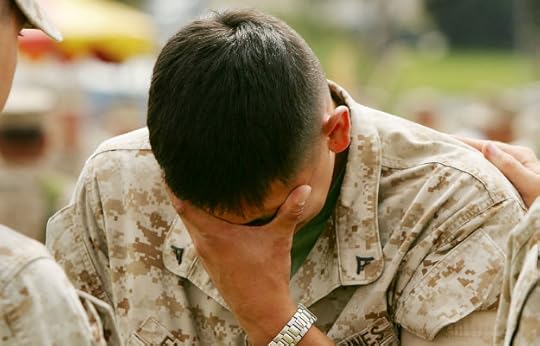
I'm surprised I haven't seen PTSD raised in the court
martial of Col.
Johnson. What if he is suffering from severe post-traumatic stress? In that
case, is he being punished for acts
that he committed as the result of his mental wounding? If so, that wouldn't
make him innocent, but it might cast a different light on his behavior.
June 11, 2012
Colin Gray misfires on COIN

I'm a
big fan of Colin
Gray's work, so I picked up his article in the new
issue of Prism with great
expectation.
I was disappointed. This is not his best stuff. Basically he
says we need to think about counterinsurgency in the context of strategy.
Indeed, he repeats the point this several different ways.
It doesn't strike me as an astonishing insight. Nor did I put down the article
thinking about counterinsurgency differently. The article is long on assertions
and short on specifics, so it feels like a lot of shadowboxing with unidentified
players.
I may well be wrong. We all have off days, and it may be
mine, not his. Gray's no slouch, so I am going to put the article aside and
re-read it down the road, and see if it feels different.
Iranians excel in naming things

A friend points out that the Iranian government recently
established the finely named "Supreme
Council for Cyberspace." Even if they are closing the
barn door a bit late.
Speaking of barn doors and snazzy wording, Paul Krugman, in
discussing the bailout of Spanish banks, uses the neat term "doom
loop."
The inside skinny on cheating at the AF Academy that they'd rather not discuss
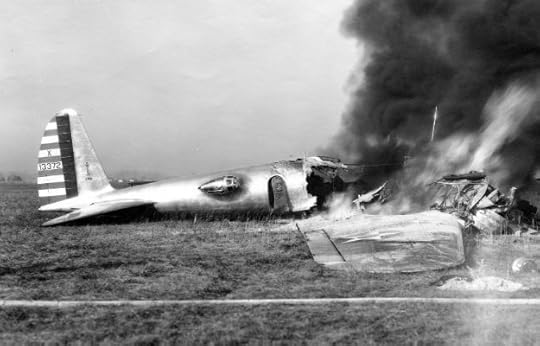
By David Mullin
Best Defense guest commenter
Air Force Academy officials recently
stated that the honor system works because, they said, 78
cadets were caught cheating on a Math 142
(integral calculus) exam.
The Superintendent, Lt. Gen.
Michael Gould, and the Vice Dean, Col. Richard Fullerton, have gone on record stating that fragmentary evidence of declining honor cases in recent years
is evidence that the honor system is working. So if the number of cadets caught
in honor violations is up, the system is working. And if known honor violations
are down, the system is working. It's no wonder that the Center for Character
Development and Leadership, the Air
Force Academy unit responsible for running the
honor system, has been consistently uninterested in using the best available
data sets in assessing the effectiveness of the honor system.
The Air Force
Academy also said that the system works because many of those 78 cadets will go
through honor probation. This program, which started in 1990, has never been
validated by the Air Force Academy. But our initial data analysis shows that is
ineffective in improving adherence to the honor code.
My research
colleague, Fred Malmstrom, has been collecting survey data following strict scientific, random-sampling procedures from graduates for nearly thirty years. It is now a comprehensive collection
spanning from the first Air Force Academy class of 1959 to the class of 2010.
Comparable data were collected from graduates from West Point and Annapolis,
and we have hundreds of observations of
cadets who resigned or who went through honor probation.
Dr. Malmstrom and
I have just completed a study which shows that the best explanation for why
honor cases have been down in recent years is that there has been a dramatic
increase of cadets tolerating others of cheating. About 70 percent of recent
Air Force Academy graduates -- significantly higher than the rate of violations
by West Point graduates -- have admitted to violating the honor code.
In 2009 when Col.
Fullerton was writing the self-study report for academic re-accreditation by the
Higher Learning Commission, he was carefully told of the existence of these very
informative data and he was offered ample help to conduct proper analysis. He
was even told of the disturbing declining trends of cadets' adherence and
enforcement of the honor code. Instead of using the data for constructive
evaluation of the honor system, he chose to claim that no data existed to do
the analysis that we are now publishing independently of the Air Force Academy.
It is no wonder that the Air Force Inspector General found that Col. Fullerton
was negligent in falsifying the self-study report. His superior Dean of
Faculty, Brig. Gen. Dana Born, was also found to be negligent in overstating
faculty credentials. Lt. Gen. Gould has chosen not to punish meaningfully either
of them.
If officers who
hold leadership positions at the Air Force Academy can get away with
dishonorable behavior, is it any wonder that many cadets are so cynical of the
honor system there? Or that large numbers of cadets cheated on the math exam?
Or that senior athletes who trashed Air Force Academy golf carts last month
were allowed to graduate by Lt Gen Gould? Or that a cadet was caught secretly
video recording two other cadets have sex in a dorm?
Corruption of
leaders breeds corruption of their subordinates.
David Mullin is a research
econometrician who teaches at the University of Colorado at Colorado
Springs. For 13 years he was an Air Force Academy economics
professor.
June 8, 2012
Going back to read Robert Graves’ WWI memoir ‘Good-bye to All That’ for 4th time
I just finished reading Robert Graves' autobiography
of World War I service for the fourth time. I read it first as a teenager
in Kabul
in 1970. (I have no idea how I happened to come across it there in Afghanistan,
or why picked it up.) I think it was the first book of military history that
ever really grabbed me, for which I remain grateful. I can't think of any other
book that I have read four times, except perhaps for some of Shakespeare's
tragedies.
I read Graves' memoir again in my 20s, at Yale, and then in
my 30s, in Washington, D.C.. It was different book each time for me. I realized
recently I hadn't looked at it in about 20 years, so picked it up to see how it
felt now. I also wanted to see what had captured me so much in the previous
readings.
I have to say I was less impressed this time. The first and
second times I read it, it seemed kind of shocking. This time it felt a bit
tame. That might be because I have read so many other memoirs, some stronger,
and also seen some war myself in Somalia, Bosnia, Kosovo, Iraq and, Afghanistan.
Some passages that struck me this time:
--On how to pick platoon leaders: "Our final selection was
made by watching the candidates play games, principally Rugger and soccer.
Those who played rough but not dirty, and had quick reactions, were the sort
needed."
--At the front, "I kept myself awake and alive by drinking
about a bottle of whiskey a day. I had never drunk it before, and have seldom
drunk it since."
--His friend Siegfried Sassoon
on leave in London: "very ill, he wrote that often when he went for a walk he
saw corpses lying about on the pavements."
--After the war, "It has taken some ten years for my blood
to recover." Also, "strangers in daytime would assume the faces of friends who
had been killed."
It made me wonder the extent to which for
Europe, World War I, with its industrialization
of killing, was the event that set the tone for the entire 20th
century. I think that maybe for the U.S., World War II was more significant,
but maybe not for Europe, and especially for the British.
Comment of the day: What he learned from 6 years of teaching at West Point
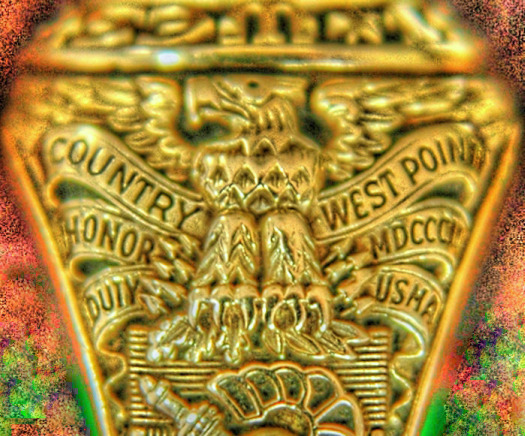
This one,
from "Catullus,"
caught my eye:
--
After six years teaching at West Point, I
came to the
same conclusion as Tom: What the hell are we wasting
our money for? The cadets are on average far less attentive than
normal college kids, and they are sequestered in an environment that imposes
the burden of their success upon their teachers in an alarmingly
disproportionate way. It was damn hard to fail a cadet. That was a sickening
experience for me personally as a teacher. What mattered more at WP was
religion and, as an extension of religion, the creation of a weirdly
narrow perspective on the importance of the place and its denizens. It was flat-out perverse in the level of self-deception it fostered. Sorry, but the place
left a palpable bad taste in my mouth. The "character building"
aspect of its pretensions was the most appalling. How do you, on an individual
level, develop character when you have a safety-net strung below you and
the institution holds teachers responsible for your success or failure?
It's nonsense."
Rebecca’s War Dog of the Week: Let’s not bet on sensors over dogs just yet
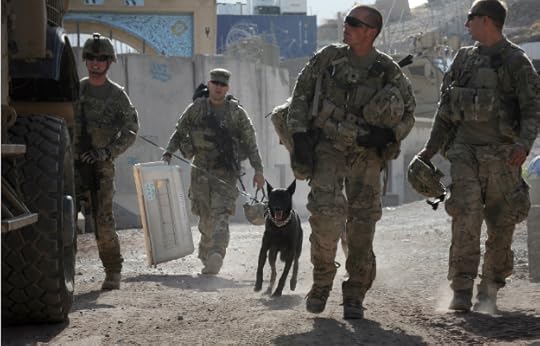
By Rebecca Frankel, Best Defense Chief Canine Correspondent
The Washington
Times ran an article yesterday that caught my attention. The
story's subhead, "Fewer canines on battlefield," made me raise a skeptical
brow, but its opening line, "In Afghanistan, a soldier's best friend is no
longer a bomb-sniffing dog, but an electronic sensor" had me scoffing out loud.
The news of the
piece is focused around the comments of Rod Korba, identified in the article as
a spokesman for JIEDDO; comments that the reporter says represent a supposed "shift"
in the organization's strategy. I assume Korba's statement is recent though no
date or forum is mentioned. Though some readers might understandably assume
this article is commenting on the MWD program at large, Korba is talking about JIEDDO's
investments, saying that JIEDDO-engineered hand-held sensors are outperforming
the JIEDDO-funded IED detection dogs (different than MWDs). "What
it comes down to," says Korba, "is we have other resources that we have had
greater statistical success, handheld sensors and things like that."
Unfortunately,
that "statistical success" is not shared in the Washington Times' report
nor is it validated by any reports of on-the-ground experience. Korba might
only be speaking of JIEDDO-funded dogs, but the lack of clarity here undermines
the work of the entire community. None of the program managers, or handlers
I've spoken to who have worked -- or are still working -- dogs downrange, say
these sensors outperform MWD teams. Furthermore, those that have seen the
sensors in action have told me they've observed battery failure, false
readings, and say that to be utilized to full effectiveness these technologies
require very controlled situations. (There's also a failure here to address
some basic points. For example: Korba references the hand-held sensor which
implies the person holding it has to be close to the source of explosives to
make a reliable find, while a dog can be worked off leash alerting to odor at a
reliable distance from source, but more importantly a safe distance from its
handler.)
Furthermore, I didn't
find Korba's comments about canines to ring with much truth -- especially his
asinine critique that dogs' effectiveness is diminished because troops "end up
befriending these animals" -- and their presentation in this instance borders
on irresponsible. Korba is quoted early on in the piece saying, "We are sort of
de-emphasizing [dogs] because we find that other technologies are far more effective"
Sort of? Well, we
are sort of still sending our dog teams out on missions. After spending
this last week talking with those in the MWD community struggling with the loss
of fellow handlers (as well as canines) who were recently KIA
in Afghanistan, this is particularly infuriating.
To be sure, there
is no perfect dog or infallible dog team. Dogs get tired, overheated, or they may
lose their nerve. Handlers also get worn down; some might even get lazy and
neglect reinforcing obedience training (a far greater offense than showing
affection to their canine partner). And combat zones are unpredictable and
terrible places -- the reality is there is simply no way to avoid every
roadside bomb.
Now that the U.S.
military is struggling with budget cuts that are likely to deepen with a troop
drawdown, we need to make sure that the troops still fighting have the best
support funding allows. The real danger with an article like this is not
only that it is intellectually or journalistically weak, but that one day soon our
troops might be conducting combat operations with electronic sensors in their
hands when what they really need is a dog by their side.
Above, U.S.
Army Sergeant Nathan Arriaga walks with Zzarr, a 6-year old Dutch Shepherd at
FOB Walton, on patrol mission with 1st Battalion 67th Armoured Regiment, Task
Force Dealers in the Arghandab district on July 25, 2011.
June 7, 2012
On veterans’ sense of entitlement: Hey, if your country is good enough to fight for, then it is good enough to come home to
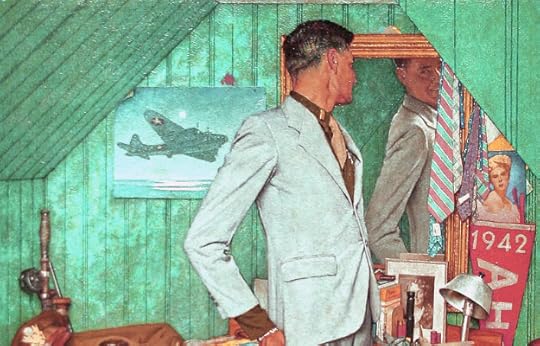
By Stacy Bare
Best Defense bureau of veterans' affairs
There is no easy way to
discuss the issue of veteran entitlement in America. It is a sensitive topic
and that there are those veterans among us who have an issue with what entitlement
is, perhaps a natural reaction. It is also a reaction that our strategic
leadership should have foreseen. When you are part of the 1 percent who serves
repeatedly and you come home to a country where most people are absorbed with Jersey Shore, the Karadashians, or Michael Vick's dog trial but
can't find Afghanistan on a map nor pick out the Chairman of the Joint Chiefs
of Staff in a lineup, it is easy to feel like society owes you something. That
is, however, not why we choose to serve and is antithetical to the nature of
service and duty.
In the immediate aftermath of
9/11, America was encouraged by our president to go back to the lives we were
used to living. We were not asked to gird ourselves for sacrifice, for war, for
men and women who would come home disconnected and misunderstood by their
communities; at worst, broken and bruised emotionally, spiritually, and
physically. Since then, the men and women who served our nation have come home
to a country that had little understanding of the war or what the war had done
to our minds and bodies. Since Korea, our veterans have deserved better, but
America was not ready then, nor were they now, for the wars of the last 11
years.
America panicked, and rightly
so; we did not want a repeat of what happened during and after Vietnam. America
did something and a lot of it. Something, however, does not always equate to
the right thing. In our attempt to heal, to be generous, and to be thankful to
those who volunteered to serve, America inadvertently created a cadre of
veterans for whom nothing would ever be good enough and at times
dis-incentivized reintegration back home. Our country was good enough to go
fight for, why isn't it good enough to come home to?
We've got a lot of work to do
in this country: It isn't just veteran issues that need fixing, and veterans
can and should take an active leadership role. For example, roughly 1,000
service members have lost an arm since we started the war in Afghanistan. An
estimated 30,000 Americans will lose an arm this year alone. Here is our
opportunity to be a hero, to be a real warrior even without our uniform, to
be leaders in our communities. To
embrace that challenge is a decision we as veterans have to make.
Our generation is easily the
best supported generation of veterans since those of World War II. A lot of the
something America has done is necessary, needed, and deeply appreciated.
However, we have been nervous to say out loud that service alone should not
guarantee free admission and the front of the line every time for every service
member.
So what do we do?
We need to follow the
examples of those veterans who have politely said "No ,thank tou" to the
handouts and asked instead for a hand up, an opportunity to excel, a level
playing field -- not free admission. We as veterans need to create a return on
investment for the sacrifices and resources we're being given by a grateful nation and we need to stand beside America in the long hard work of creating a
better future for younger generations, not just wait for free tickets to the
next baseball game.
Does the Air Force Academy have ‘the least educated faculty’ in the country?

Jeff
Dyche, who used to teach at the Air Force Academy, asserts so in an article
I read yesterday. At the academy, he writes, "Learning for the sake of learning
was all but anathema. ... Combine this
attitude with a faculty that may comprise a group of the least educated college
instructors in the entire country and you have the basic framework of the US
Air Force Academy."
Dyche, who now teaches
at James Madison University, adds that at the academy, it seemed to him that
academic work "took a back seat of military training, athletics, religiosity
and ... 'character building'."
I also
didn't know that all faculty members are required to be in their offices at
7:30 am, even if they have no morning classes, and that civilian faculty have
to fill out time cards every week.
When
I read articles like this I wonder why we still have military academies, if
they aren't producing officers any better than those from ROTC and OCS routes.
It seems to me that the academies are producing bright but undereducated
officers at great expense. As Dyche notes, it costs taxpayers five to ten times
more to produce a service academy officer as it does a ROTC officer.
Juan Cole finds Libya surprisingly secure
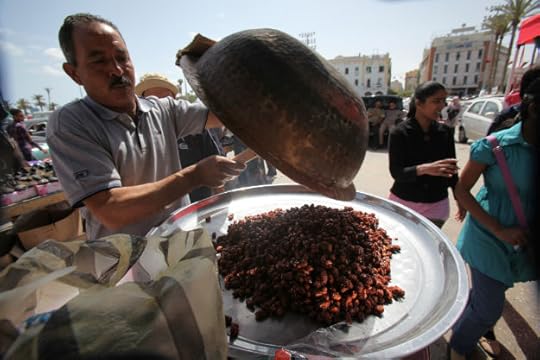
He says
fears about it falling apart or into civil war are overblown:
... on visits to Benghazi, Misrata and Tripoli, to find that
there were no militiamen to be seen, that most things were functioning
normally, that there were police at traffic intersections, that there were children's
carnivals open till late, families out, that jewelry shops were open till 8 pm,
that Arabs and Africans were working side by side, and that people were proud
in Benghazi of having demonstrated against calls for decentralizing the
country.
As someone who has lived in conflict situations, I take as a very
serious gauge of security whether shops are open and how late they stay open.
Jewelry shops in particular are easily looted, and the loot is light and easy
to fence. But in Tripoli there was loads of gold in rows of jewelry shops,
along with clothing stores newly stocked with Italian fashions."
Thomas E. Ricks's Blog
- Thomas E. Ricks's profile
- 436 followers



